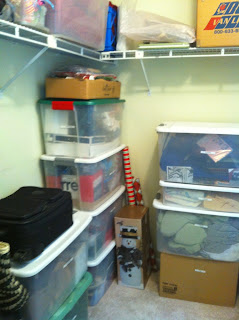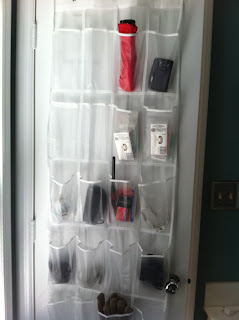And This Book Has Been Challenged/Banned Why?
- 4 Comments
- Tags: banned books, fiction
Things I Don’t Need: The Urge to Purge Part 2
A few weeks ago, I wrote about working with a professional organizer. Let me tell you, it is some of the best money I’ve ever spent.
I feel so unburdened now, so liberated. I feel in control of my environment. I feel like I can maintain this. In fact, I have.
So let me tell you a bit about this journey.
Entire families live in houses the size of mine or smaller. So how is it that I had no extra storage capacity? It was a couple of things: as I said in my original post on the Urge to Purge, part of it was laziness and part of it was a sentimental attachment to things that didn’t need it. But one key thing is that I think you have to be in the right headspace to take on this type of effort. Now, I wasn’t a hoarder. I just had too much stuff, and was holding on to things I didn’t need. But it was overwhelming to get started on clearing it all out. It seemed like too big of a job to start.
But earlier in the year, I got my finances in order, then I worked with a life coach and got my priorities in order. I think getting my environment in order was the natural next step.
I worked with Suellen from Creative Order (http://www.creativeorder.com). Our first meeting, she walked through the house with me, and listened to my goals. We talked about a plan of attack, and agreed to 4 sessions about 4 hours each. I secretly wondered if that would be enough. But it was. We worked through the house room by room. The first thing we tackled was the master bedroom closets. Remember the “Monica Closet” from Friends? Picture that times two. Or three.
But we did it. Here’s what they look like now:
There are two easy tricks I picked up. One is a bin that goes up and down the stairs with me. When I need to take things upstairs, they go in the bin, and at the end of the day, the bin goes upstairs with me, and things go in their proper place. Similarly, when something from upstairs needs to come downstairs, same concept. This is Magic the Cat trying out the bin:
One of the other quick wins? A re-organized personal workspace. This is where I pay the bills and shred documents. Yes, I have a study, but I didn’t want this set up there. Like Suellen said, to be something I’ll keep up with, it needs to be an area where I’ll use it. So this little unused space in the living room became the perfect work nook.
- 5 Comments
- Tags: Organization
Banned Books Week
Banned Books week starts today and runs through 2 October. I have read some bad books. I have read books that offended me on some level. But I’ve never read a book I think should be banned. That is an evil,scary practice to me.
I remember in high school, The Grapes of Wrath was one of the books challenged in our school district. The Junior and Senior Honors/AP English classes at my school invited the challenger in to hear why he felt these books should be banned.
He objected to the use of the word “goddamn” in the book. The use of racial slurs didn’t seem to bother him too much. He said, “that was the vernacular of the time. It is what a lot of people would have said.” To which my friend Will replied, “And you think ignorant farmers wouldn’t have used ‘goddamn’?” If we banned every book that had an offensive word in it, we’d have nothing to read. Plus, most people I know are smart enough to understand the context in which words are used.
But I look at the American Library Association’s list of Banned Books, and I start to get a little ill. I’ve read and loved more than half of the books on the Banned Books list (2000-2009 most challenged/banned). And I think how empty my life would be without these books.
Take the Harry Potter books, the most challenged/banned of 2000-2009. I adore these books. I know that when they were challenged in a district near me, the woman leading the charge had not even read the books. She had read that “other people” said they were bad and led a campaign to get them out of her children’s school libraries. To challenge something you’ve not even read? That’s such an ignorant thing to do. And to presume that you know better for someone else’s children? No.
At Dragon*Con this year, I attended a young adult literature panel called “Freaks and Geeks in Harry Potter.” I was older than a lot of the attendees. But most of the audience grew up with the Harry Potter books. And to hear these young people, who were all geeks or nerds or dorks or artists or in some other way, not quite the popular mainstream in their schools, say how much it meant to them to have the heroes in the Harry Potter books also be freaks and geeks brought me to tears.
Because perhaps in youth, more than any other time, it is important to know that when you aren’t quite sure who you are and how you fit into the world, it is important to know you aren’t alone. And so many of the banned and challenged books are aimed at this group of people.
I think most people who challenge books are motivated by fear. They are scared of their children being exposed to new ideas. I was blessed to be raised by readers. People who felt that reading was one of the best ways to be exposed to new ideas and expand thought. Open one’s mind to new possibilities.
Banning books narrows our minds. It reinforces the idea that there’s only one way to think, one way to be. It encourages fear and xenophobia. It subjects people to warped understanding of content, like Wesley Scroggins’ description of a rape in Speak (just one book he is trying to get removed from school shelves in Missouri) as “soft porn.” I don’t know what types of porn Mr. Scroggins typically reads or views, but it has always been my belief that non-consensual sex is an act of violence, and not titillating. I was also surprised by his criticism of the classification of some of the girls in Speak who partied on Saturday night, but appeared as virginal goddesses in Sunday morning services. Frankly, that describes most people I know. There’s quite a fine line between Saturday night and Sunday morning. I was also disappointed that, as an associate professor of management, Mr. Scroggins’ is so literal and doesn’t appear to understand hyperbole.
I find that the most profound ideas, the stories that made me think the most as a student and young adult, are represented in the challenged and banned books. So read one. Encourage your friends and family to read them, and to think. I live in an area where intellectualism is often treated as a four-letter word. Well, I’m quite fond of four letter words, so I’m proud to wear that label.
And if reading controversial ideas and thinking for myself makes me somehow subversive, then that’s a label I’ll proudly adopt as well.
- 3 Comments
- Tags: banned books
Speak. Speak Loudly. It’s Subversive.
- 2 Comments
- Tags: banned books, fiction
Messy Sloppy Politics
- 0 Comments
- Tags: Meghan McCain, Memoir, non-fiction








